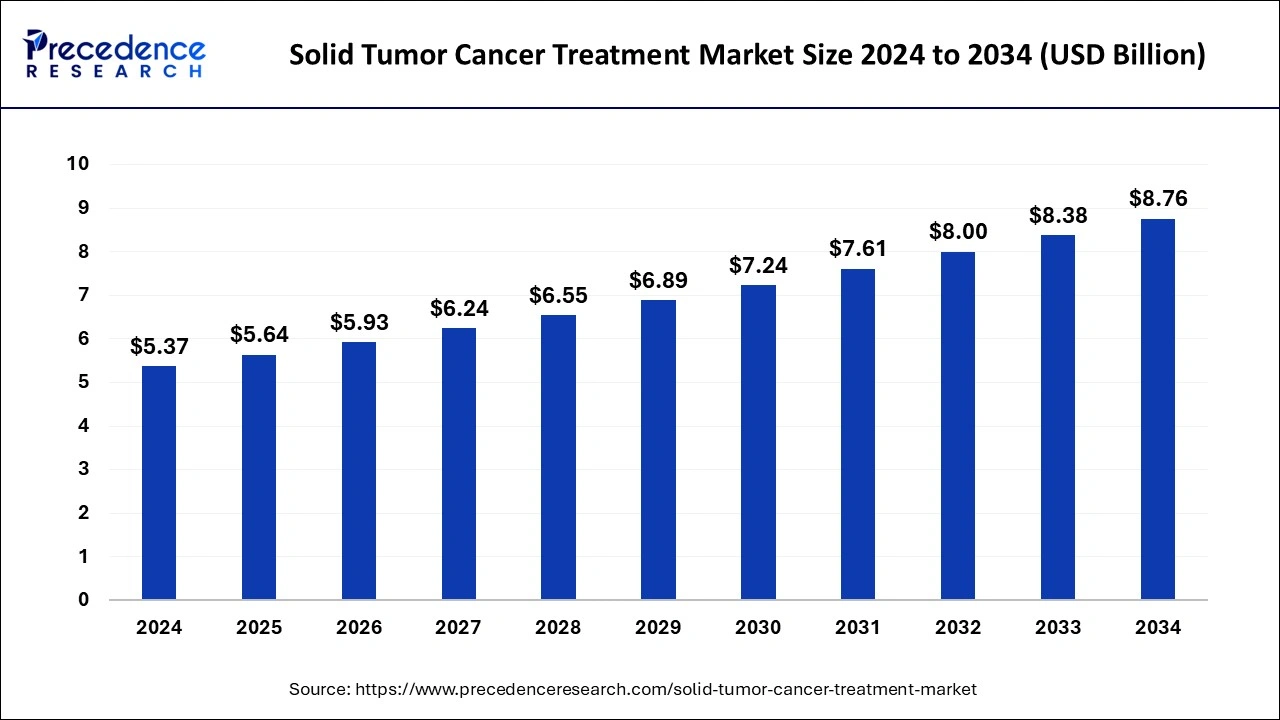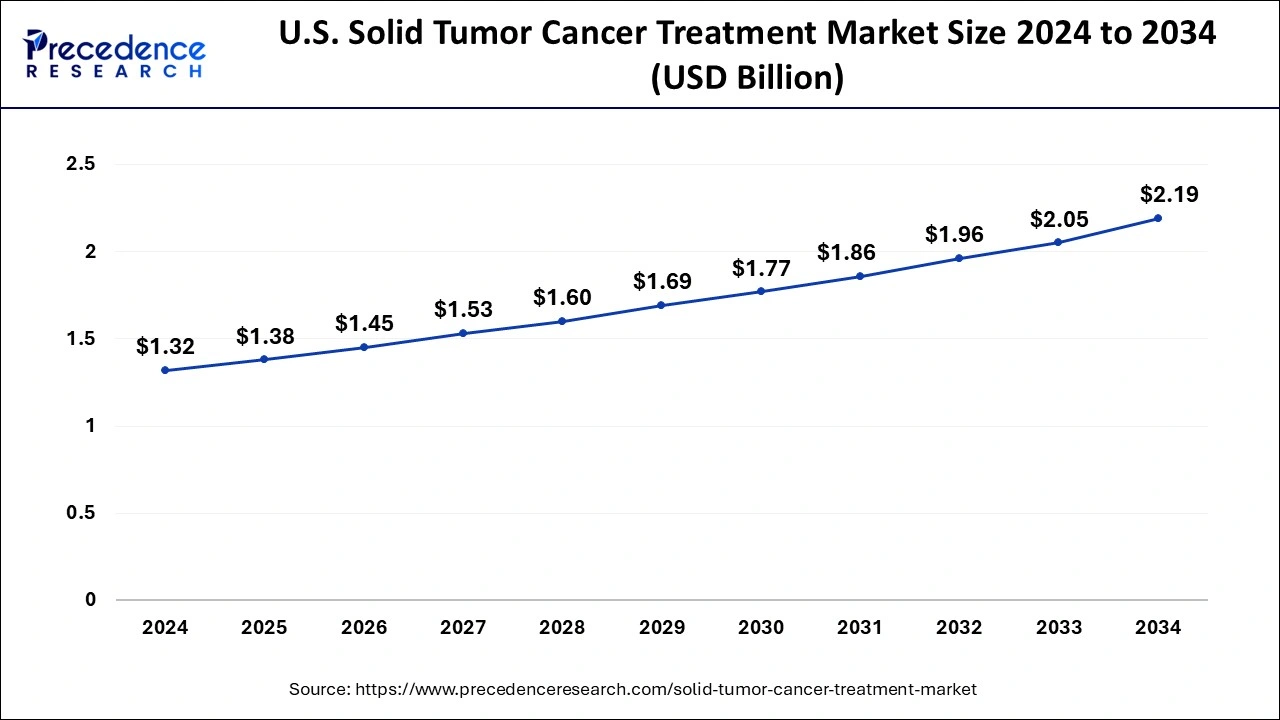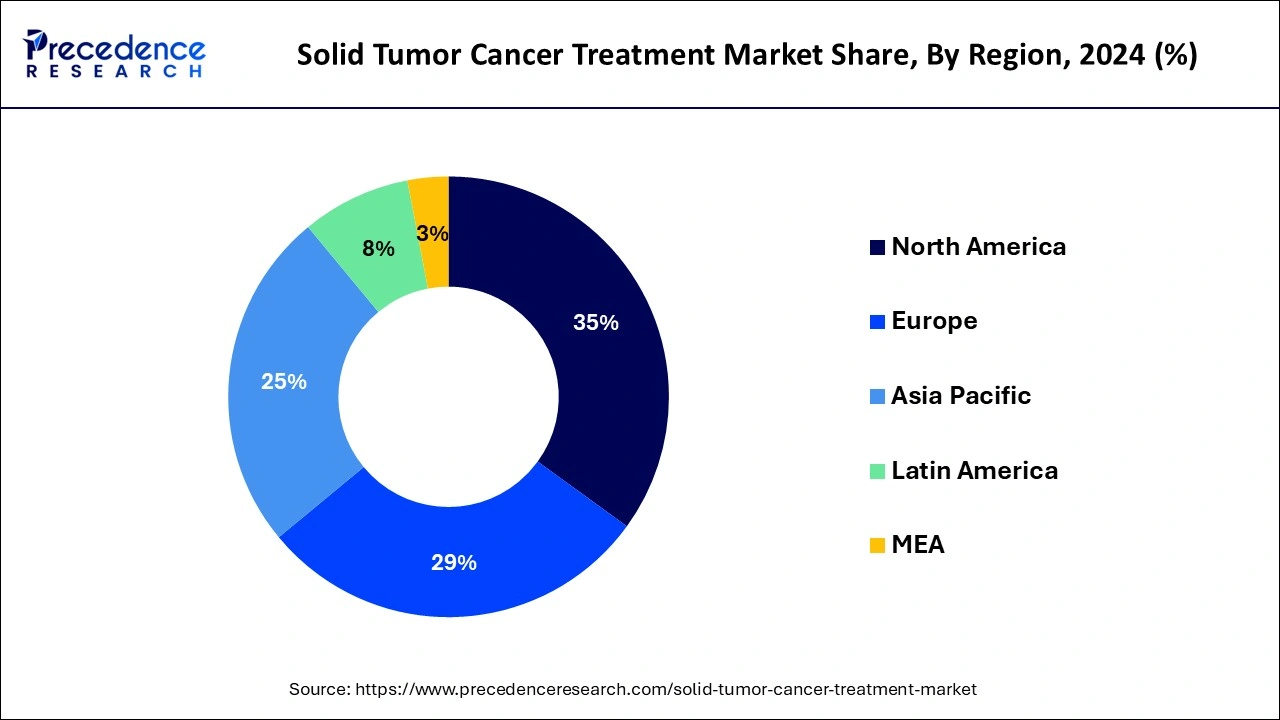Solid Tumor Cancer Treatment Market Size and Forecast 2025 to 2034
The global solid tumor cancer treatment market size was estimated at USD 5.37 billion in 2024 and is anticipated to reach around USD 8.76 billion by 2034, expanding at a CAGR of 2.88% from 2025 to 2034. The increasing prevalence of cancer disease among the population due to the changing lifestyle and sometimes genetics which boosts the demand for the market

Solid Tumor Cancer Treatment Market Key Takeaways
- North America dominated the global solid tumor cancer treatment market with the largest market share of 35% in 2024.
- Asia Pacific is expected to grow at a significant CAGR during the forecast period.
- By treatment , the chemotherapy segment contributed the highest market share in 2024.
- By end-Users , the hospitals segment is projected to grow at a notable CAGR during the forecast period.
How Can AI Impact the Solid Tumor Cancer Treatment Market?
The integration of AI can significantly impact cancer treatment with providing effective solutions in the treatment and medication process. AI can enable and identifies the new targeted therapies and drugs, improve cancer immunotherapy, valuate the sensitivity and resistance of anticancer drugs, new therapeutic targets, predict the prognosis, discover new biomarkers, and survival analysis of tumor patients.
- In January 2025, Renovaro Inc., a leader in AI powered cancer diagnostics and therapeutics entering on the LOI to acquire Predictive Oncology in an all-stock transaction. The acquisition aims to provide access to critical resources including 200,000 pathology slides, biobank of more than 150,000 tumor specimens, and decades of longitudinal drug response
U.S. Solid Tumor Cancer Treatment Market Size and Growth 2025 to 2034
The U.S. solid tumor cancer treatment market size was evaluated at USD 1.32 billion in 2024 and is predicted to be worth around USD 2.19 billion by 2034, rising at a CAGR of 3.09% from 2025 to 2034.

The solid tumor cancer treatment market is segmented into North America, Asia Pacific, Europe, Latin America, and Middle East & Africa. The North American region dominates the solid tumor cancer treatment market owing to the rising technical advancement and an increasing number of cancer patients. Along with this, the presence of significant investors in research and development (R&D) in the region contributes to the growth of the solid tumor cancer treatment market. The Asia Pacific region is likely to show a significant increase during the forecast period of 2022-2030 due to developing healthcare infrastructure.

Considering the growth of the Europe region, Germany is likely to boost the development of the solid tumor cancer treatment market because of an increasing number of clinical trials being conducted in the country. The rapidly increasing number of female patients with breast cancer and rising targeted therapies to control the spread of cancer are other factors to propel the growth of the solid tumor cancer treatment market. The Middle East and Africa contribute a negligible market share among all regions. But increasing the R&D sector with the presence of investors is anticipated to boost the solid tumor cancer treatment market in golf countries. Rising medical expenditure is likely to show significant growth in the market for the Middle East region.
Market Overview
Solid tumor cancer is a grown solid mass that can occur on any body part. Solid tumor cancer refers to the condition in which abnormal cells divide without control. After cardiovascular and infectious diseases, cancer is considered the world's third most lethal disease. Solid tumors can occur on bones, muscles, or any organ. In medical terms, not all solid tumors are referred to as cancer, but solid tumors with cancerous cells are called malignant tumors. Solid tumor cancer includes cancer of the lungs, breasts, skin, head, neck, colon, prostate, and bladder. A biopsy is a process widely used to detect solid tumor cancer in the body in which tissue from a tumor is removed and sent to a pathologist for testing. Other measures oncologists take to detect solid tumor cancer are Magnetic Resonance Imaging (MRI) and Computed tomography (C.T.) scan.
Solid Tumor Cancer Treatment Market Growth Factors
- Rise in the demand for reliable treatment: the increase in the cancer cases among population and the demand for efficient treatment such as regular chemotherapy sessions is widely preferred by oncologists that shrink the tumor and stop the spread of cancer which contributes in the growth of the market.
- Advancements in treatment: the solid tumor cancer treatment market demands advanced therapeutic approaches for cancer treatment which is focused on innovative methods that help boost the body's anti-cancer immune surveillance mechanism that helps in expansion of the solid tumor cancer treatment market.
- Increasing R&D: The rise in research and development and the ongoing investment in innovative cancer treatment for solid tumor cancer treatment to reduce mortality is contributing in the market growth.
Market Scope
| Report Coverage | Details |
| Market Size in 2025 | USD 5.64 Billion |
| Market Size by 2034 | USD 8.76 Billion |
| Growth Rate from 2025 to 2034 | CAGR of 2.88% |
| Base Year | 2024 |
| Forecast Period | 2025 to 2034 |
| Largest Market | North America |
| Segments Covered | By Type, By Treatment, By Route of Administration, By End-Users |
| Regions Covered | North America, Europe, Asia-Pacific, Latin America, Middle East & Africa |
Market Dynamics
Driver
Increasing awareness regarding self-health
The awareness of self-health care has increased the demand for early screening, which contributes to the growth of the solid tumor cancer treatment market. The research, production, and need for biosimilars have recently increased. The rapidly growing demand for biosimilars is another driving factor for the solid tumor cancer treatment market. Biosimilars are drugs produced in a similar structure as biological medicine, and they help reduce the overall cost of solid tumor cancer treatment.
Restraint
High cost of treatment
The high cost associated with the treatment and medications is a significant restraint for the market. The price range for advanced drug research and development (R&D) is another factor that hampers the solid tumor cancer treatment market. Along with this, the threat of failed therapy and prolonged side effects of chemotherapy and cancer drugs are also seen as restraining factors for the growth of the solid tumor cancer treatment market.
Opportunity
Government initiatives in treatment and medication of cancer
Increasing government initiatives, rising investments in the research and development (R&D) sector, innovation of advanced medicine, and a rise in testing for early detection of cancer. The rise in the number of various cancers across the globe drives the growth of the solid tumor cancer treatment market. Increasing healthcare in developing countries welcomes advanced medical treatment. The advancement in the oncology department brings change to the solid tumor cancer treatment market.
Type Insights
The solid tumor cancer treatment market is segmented by type into Sarcomas and Carcinomas. Carcinoma is a prevalent type of solid tumor cancer detected in the diagnosis process. In carcinomas, tissue is formed in epithelial cells, which are found in the skin, glands, or organ linings. Increasing numbers of patients with adrenocortical carcinomas are likely to propel the growth of the solid tumor cancer treatment market. Adrenocortical carcinoma is a condition in which a solid tumor is formed in adrenal glands located under the kidney. In sarcomas, a solid tumor is formed in the blood vessel, bones, or lymph vessels.
Treatment Insights
By treatment, the solid tumor cancer treatment market is segmented into Chemotherapy, Immunotherapy, and Targeted therapy. Chemotherapy holds the largest share of the solid tumor cancer treatment market. In this treatment type, the cancer drugs are inserted into the body with an inserting tube using a needle. Sometimes, chemotherapy is done by providing medicines that can be consumed orally. Although it carries significant risks of side effects, chemotherapy is seen as the most potent treatment to kill rapidly growing cancer cells.
Stomach, skin, prostate, and sarcoma cancers can be treated with immunotherapy. Immunotherapy is administered directly into the body by injection into a vein or muscle. It acts on the immune system of solid tumor cancer patients. Targeted therapy is also one of the essential therapies conducted in the treatment of solid tumor cancer owing to its benefit. Targeted therapy kills cancer cells by not damaging healthy cells. Healthcare providers or oncologists may suggest targeted therapies if other treatments fail to be ineffective.
Route of Administration Insights
By route of administration, the solid tumor cancer treatment market is segmented into Oral, Parenteral, and Others. In the oral way of administration, the medicine or drugs are given by mouth in the form of liquid, capsule, or tablet. Oncologists suggest an oral route in chemotherapy at the early stage of cancer. The parenteral route of administration is commonly used in the treatment of solid tumor cancer treatment in which the drugs are given by injection or infusion. The utilization of the parenteral route of administration is seen in growing the solid tumor cancer treatment market as it allows the drugs to be absorbed quickly and predictably into the cancer patient's body. On the other hand, the parenteral route of administration as treatment of solid tumor cancer is expensive compared to the oral route of administration which hampers the segment growth in the solid tumor cancer treatment market.
End-Users Insights
By end-users, the solid tumor cancer treatment market is segmented into Hospitals, Research institutes, Homecare, and Others. Hospitals are the fastest growing end-user for the solid tumor cancer treatment market owing to the increasing prevalence of types of cancer. Hospitals are developing by providing specialty centers for solid tumor cancer treatment. Additionally, they are considered the fastest-growing segment with growing healthcare infrastructure in developing countries such as India, Indonesia, Iran, Kenya, and others. At the same time, research institutes play an essential role in the growth of the solid tumor cancer treatment market by providing advanced drugs and technology for better healthcare services.
Solid Tumor Cancer Treatment Market Companies
- F.Hoffman- La Roche Ltd.
- Mylan N.V.
- Sanofi, Pfizer
- Merck & Co
- Allergan
- AstraZeneca
- Novartis AG
- Bayer AG
- Lupin.
Recent Development
- In June 2024, TwoStep Therapeutics, one of the leading biotechnology company works on the development of new targeted therapeutics for solid tumors, officially introduced following a successful $6.5 million seed round led by NFX, in partnership with the other investors including Alexandria Venture Investments, 2048 Ventures, the family office of the founder of Arcadia Investment Partners, and Cooley's affiliated fund GC&H Investments.
- In September 2024, Penn State College of Medicine, Four Diamonds, Childhood Cancer Research Consortium, and Senhwa Biosciences, Inc. launching clinical trial for the evaluation of the investigational drug silmitasertib, integration with FDA-approved drugs for solid tumors.
Segments Covered in the Report
By Type
- Sarcomas
- Carcinomas
By Treatment
- Chemotherapy
- Immunotherapy
- Targeted Therapy
By Route of Administration
- Oral
- Parenteral
- Others
By End-Users
- Hospitals
- Research Institutes
- Homecare
By Geography
- North America
- Europe
- Asia-Pacific
- Latin America
- Middle East & Africa (MEA)
For inquiries regarding discounts, bulk purchases, or customization requests, please contact us at sales@precedenceresearch.com
Frequently Asked Questions
Ask For Sample
No cookie-cutter, only authentic analysis – take the 1st step to become a Precedence Research client
 Get a Sample
Get a Sample
 Table Of Content
Table Of Content
 sales@precedenceresearch.com
sales@precedenceresearch.com
 +1 804-441-9344
+1 804-441-9344
 Schedule a Meeting
Schedule a Meeting